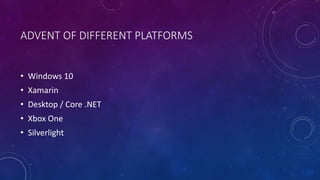Introduction to portable class libraries
- 1. INTRODUCTION TO PORTABLE CLASS LIBRARIES MICHAEL JOHN T PENA DEVELOPER / CONSULTANT
- 2. ABOUT ME ŌĆó Agile Developer at Accenture Inc ŌĆō Avanade PDC ŌĆó Technology Enthusiast ŌĆó Startup Enthusiast ŌĆó Mentor to Students ŌĆó Loves Wine
- 3. ADVENT OF DIFFERENT PLATFORMS ŌĆó Windows 10 ŌĆó Xamarin ŌĆó Desktop / Core .NET ŌĆó Xbox One ŌĆó Silverlight
- 4. THE CHALLENGE ŌĆó Sharing code between platforms were ŌĆ£not that simpleŌĆØ ŌĆó Each platform have a designated ŌĆ£Class LibraryŌĆØ ŌĆó Shared Project is still limited
- 5. ORIGIN OF PCL ŌĆó Microsoft created a Visual Studio extension for VS2012 / VS2013
- 6. HOW IT WORKS? ŌĆó You tick the platforms you like to support. Then that portable class library will be sliced into those libraries which are common to them.
- 8. WHERE DO WE USUALLY USE PCL? ŌĆó Sharing Data Access and Service Layer of Apps ŌĆó Sometimes on ViewModels ŌĆó Sharing Common Utilities and Helper Classes ŌĆó Just One Unit Test for shared Functionalities
- 9. SOME LIBRARIES THAT WORKS WITH PCL ŌĆó MVVM Light ŌĆó Json.NET ŌĆó Microsoft HTTP CLIENT Libraries (Microsoft.Net.Http / HttpClient)
- 10. SPECIAL CASE: WHAT IF YOU CANNOT SHARE CODE BUT HAVE SAME BUSINESS LOGIC? ŌĆó Platform Indirection. ŌĆó You create custom code for that platform, but still extends the same Interface. ŌĆó You use reflection to resolve the class at run time.
- 11. QUESTIONS AND ANSWERS? CONTACTS ŌĆó www.fb.com/mjtpena ŌĆó www.linkedin.com/michaelpena ŌĆó mjtpena@outlook.com ŌĆó @mjtpena











